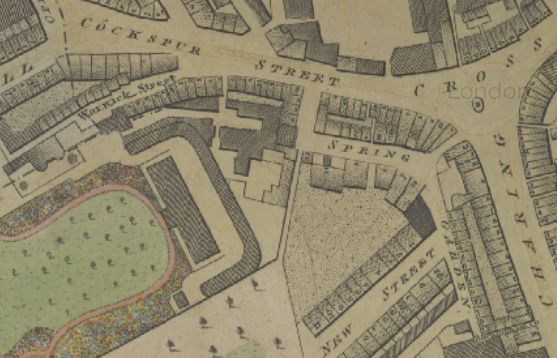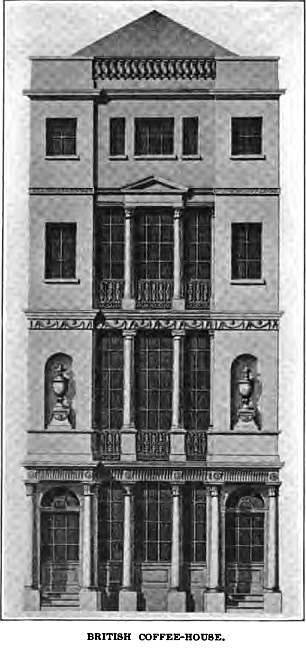

Search london history from Roman times to modern day
St Martins pub history index

Spring Gardens, Cockspur street and Charing Cross in 1799
The British Coffee House in Cockspur street is noted as being open since 1722. With the sister of Bishop Douglas in charge in 1759. The List of Masonic Lodges of 1740 - 1755 note that a masonic lodge met at the British Coffee House, Charing Cross with a constitution date of April 28th 1739

British Coffee House
Nearer Charing Cross was the British Coffee house, the site of which, one of the oldest taverns in London, was afterwards occupied by Stanford's, the map-publisher. Of some interest from a structural point of view, as the work of one of the " Adelphi " Adamses, it was a favourite resort of Smollett and was frequented by Dr. Johnson and other literary celebrities. Defoe, in his " Journey through England," says "The Scots go generally to the 'British,' and a mixture of all sorts to the 'Smyrna.'" Under the proprietorship of Messrs. Morley, the "British" was, in 1815, famed for the excellence of its wines. Tickets were to be had at this Coffee-house, in May 1742, for the "Tragedy of Cato' followed by a farce, "The Intriguing Chambermaid," presented at the Theatre Royal, Drury Lane. This old landmark was effaced in 1887, and Stanford's premises were acquired by the London County Council in the latter part of 1899, for the extension of their offices. The Lowtonian Society, so named in honour of its founder and first president, Thomas Lowton, Clerk of the Nisi Prius, met at the British Coffee-house in 1796. It was formed for the association of gentlemen and mutual protection "against insidious attempts to injure their professional reputation." Thomas Lowton was "a highly respected member of the Inner Temple, who was honoured by the confidence of three successive Lord Chief Justices, and held the office of Clerk of the Nisi Prius for forty years."
After 1796 the society left the " British," and favoured most of the principal club taverns with their patronage.^ An excellent account of this, one of the last, if not the last, of the old tavern-clubs, was given by some extremely well-informed writer in the " Daily Telegraph " for September 19, 1899. One of its earliest visitors was the Hon. James Erskine, one of the Supreme Judges of Scotland, who was so bitterly opposed to Walpole's policy that he gave up his judgeship in order to come to Parliament During his annual visits to the metropolis he contracted an intimacy with the landlady of the coffee-house — a handsome Scotchwoman named Fanny Lindsay — that did not conduce to his domestic felicity. Accordingly, by the aid of Lord Lovat, the famous plotter whom Hogarth so skilfully depicted, Erskine carried his wife to " St. Kilda's lonely Isle," and there left her in miserable exile for many years.
In 1745 — the year of "Bonnie Prince Charlie's" rising — four Scotchmen, all destined to succeed in life, were wont to meet at the "British." These were Tobias Smollett, a struggling surgeon in Downing Street, as yet tmknown in the literary way; Alexander Carlyle, afterwards minister of Inveresk, and author of a delightful autobiography ; John Blair, a fiiture prebendary of Westminster ; and " Bob " Smith, who is believed to have been the successor of Bentley as Master of Trinity College, Cambridge. "Jupiter" Carlyle, so called because he had sat to Gavin Hamilton in that character, had fought under Cope at Prestonpans, and had been an eye-witness of Provost Stuart's neglect to defend Edinburgh, a neglect which nearly brought him to the Tower on a charge of treason. The four, says the writer in the " Daily Telegraph " alluded to, were at the coffee-house when the news of Cumberland's victory at CuUoden came.
Provost Stuart's son, who was in the room, went out cursing, and Smollett was indignant with the mob for exulting over the savageries of the Duke. Carlyle and he walked from the coffee-house to Mayfair, through lines of bonfires, and an incessant fusillade of squibs.
When next they met at the coffee-house, Smollett read to them the first six stanzas of a poem entitled " The Tears of Scotland." His friends thought it too strongly worded, but he would have no temporising with prudence, and sat down and wrote a seventh stanza.
Another friend whom Carlyle used to meet there was Captain David Cheap, who had sailed with Anson during his famous voyage.
The captain was looking out for an author to write the account of the voyage, and came there to make the acquaintance of William Guthrie, then a very popular writer, but was so disgusted with his vapouring, cursing, and swearing that he went away without seeking an introduction.
The writer of this interesting contribution to the literary history of London continues :
"In 1758 John Home came to London with his tragedy of 'Douglas.' He was fortunate enough to secure the patronage of Lord Bute, and soon found himself in the centre of a very pleasant society. Among his daily companions were Wedderbum, afterwards Lord Loughborough, Sir Henry Erskine, Robert Adam, the future architect of the Adelphi, David Garrick, John Douglas (then secretary to the Earl of Bath, and afterwards Bishop of Salisbury), Sir Gilbert Elliot, Dr. Armstrong, Smollett, Dr. Pitcaim, of St
Bartholomew's, and William Hunter, the famous anatomist, and brother of the still more famous John Hunter. These formed themselves into a social club, which met at the ' British.' Several of them belonged to another Scotch club also meeting there, of which Robertson, the historian, was a member. Hunter was a man of brilliant conversation, and his favourite toast was : ' May no English nobleman venture out of the world without a Scottish physician, as I am sure there are none who venture in ' — an allusion to the fact that the obstetric practice in London was then almost entirely in the hands of Scotchmen. The coffee-house was then kept by Mrs. Anderson, sister of the John Douglas above-mentioned, and is highly spoken of by Mackenzie, Lord Brougham, and several contemporary writers.
"The house was rebuilt in 1770, the architect being, appropriately enough, Robert Adam ; doubtless he worked con amare on the rebuilding of a house in which he had passed so many pleasant hours, and met so many notable people. At all events, its elevation ranked among the most pleasing of his productions.
" Johnson dined at least once in the new house with Boswell, who records that they spent a very agreeable day together. Gibbon also was there, and in very good company, which included Garrick, Colman, Goldsmith, Macpherson, and John Home. They were getting up a claque to launch Colman's 'Man of Business,' and the next day they all went in a body to support it.
" At a later date John Lord Campbell was a member of a Scotch club — The Beeswing — meeting here to uphold the time-honoured institutions of eating and drinking. The latter, says Campbell, was 'tremendous,' but the conversation was as good as any he had ever joined in.
'In 1824 we find the place already described as 'The British Hotel and Coffee-house'; subsequently the words 'and Coffee-house ' disappeared from its style altogether." In Angelo's " Pic-Nic " (1834), the Author says he belonged to a club which used to assemble at the British Coffee-house called the " Keep-the-Line," the greater number of whose members were literary characters.
W. S. Fitzgerald, well known for his poetical effusions, was one of the members and was always introduced here after dinner (p. 322).
"Deserted by Scotchmen, the hotel became a favoured resort of Americans ; but the clubs of men of wit and learning gave place to the shows of canary fanciers. Though its glory was departed, the hotel business was carried on till 1886, when the place was demolished in order to clear a site for Stanford's new premises."
A listing of historical public houses, Taverns, Inns, Beer Houses and Hotels in St Martins in Fields, London.
Residents at this address.
1811/D & A Morley, British Coffee house, & wine merchants, 27 Cockspur street, Charing cross/../../Holdens Directory
1822/British Coffee House, Cockspur street/../../History of Yorkshire Directory
1827/John Element, British Coffee House, Cockspur street/../../Pigots Directory
1829/J Clement, British Coffee House, 27 Cockspur street/../../Pigots Directory
1832/John Element, British Coffee House, 27 Cockspur street/../../Pigots Directory
1833-34/John Element, British Coffee House, 27 Cockspur street/../../Pigots Directory
1833-34/Mary Hastie, Morleys British Coffee House and Hotel, 25 Cockspur street/../../Pigots Directory
1836/John Element, British Coffee House & Hotel, 27 Cockspur street/../../Pigots Directory
1841/Jno Element/Inn Keeper/55/../Census
1841/Sarah Element/../50/../Census
1841/Mary Dowden/Female Servant/30/../Census
1841/Elizabeth Hawkins/Female Servant/20/Middlesex/Census
1841/Cuthbert Fownes/Male Servant/25/../Census
1841/Frederick Smith/Male Servant/15/../Census
1841/Mary Bond/Female Servant/30/Middlesex/Census
1841/George Guest/Male Servant/20/Middlesex/Census
1841/Mary Davis/Female Servant/20/../Census
1841/Ellen Higgins/Female Servant/20/Ireland/Census
1841/Amelia Walker/Female Servant/25/../Census
1841/Talbot Chester/Independant/25/Ireland/Census
1841/Henry Chester/Independant/69/Ireland/Census
1841/Charles Mee/Inn Keeper/50/Ireland/Census
1841/William Edwards/Independant/40/../Census
1841/John Clark/Builder/55/../Census
1841/Alex Carrol/Independant/60/Ireland/Census
1841/Norman McLeod/Independant/60/../Census
1843/../British Coffeehouse and Tavern, 27 Cockspur street /../../Post Office Directory
The Era 25 July 1847 - Transfers :
British Hotel, Cockspur street, to Sarah Briant, widow and executrix of Henry Briant, late occupier
Era 24 October 1847 - Transfers :
British Coffee House, Cockspur street, Sarah Briant to Charles Heginbotham
1848/Mrs Sarah Briant, British Hotel, 27 Cockspur street/../../Post Office Directory
1874/A. F. C. Mayer, British Coffee House, 27 Cockspur street, Charing cross, SW /../../Post Office Directory
1881/Augustus F G Myer/Hotel Proprietor/52/Hanover Naturalised/Census
1881/Elizabeth H Myer/Wife/42/Lee, Kent/Census
1881/Alice J Myer/Daughter/19/Strand, Middlesex/Census
1881/Edith G Myer/Daughter/11/Lee, Kent/Census
1881/Augusta L Myer/Daughter/9/Lee, Kent/Census
1881/Fredk Wv Myer/Son/8/Westminster, Middlesex/Census
1881/Edward P Cox/Boarder, Solicitor/34/Tickenhall, Derby/Census
1881/Christine Hochmuth/Nurse/27/Germany/Census
1881/Eleanor Deeks/Barmaid/28/London, Middlesex/Census
1881/Robet Edwards/Inn Servant/35/St Georges East, Middlesex/Census
1881/Wm Roll/Porter/23/St Georges East, Middlesex/Census
1881/Sarah Silver/Kitchenmaid/25/Guildford, Surrey/Census
1881/Mary E Bulmer/Stillroom Maid/28/Leeds, York/Census
1881/John Horn/Waiter/22/Guernsey, Channel Islands/Census
1881/Annie Gibson/Cook/32/Croydon, Surrey/Census
1881/Mary Sole/Housemaid/23//Census
1881/Wm Hy Jones/Boarder, Gentleman/22/Kinloch, Perth, Scotland/Census
1881/Washington Savage/Boarder, Gentleman/23/Philadelphia/Census
1881/George Taylor/Night Porter (Inn)/31//Census
1881/Fanny Jane Plumber/Chambermaid/23//Census
1881/Norman Poclim/Boarder, Capt Royal Fusiliers/34/Barbbag,
Leicester/Census
1881/Forbes Scott/Boarder, Surgeon/21/Swansea, Wales/Census
1881/Wm S Bewicke/Boarder, Cooper/29/(British Subject), Madeira,
Portugal/Census
1881/Edward J Holland/Hotel Manager/33/Leytonstone, Essex/Census
1882/Augustus Myer/../../../Post Office Directory
** Provided By Stephen Harris
Trying to avoid privacy and cookie settings overwriting content